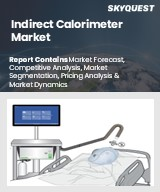
|
시장보고서
상품코드
1796831
공진 시험기 시장 : 세계 산업 규모, 점유율, 동향, 기회, 예측 - 유형별, 용도별, 최종 이용 산업별, 지역별 부문, 경쟁(2020-2030년)Resonant Testing Machines Market - Global Industry Size, Share, Trends, Opportunity, and Forecast, Segmented By Type, By Application, By End-Use Industry, By Region & Competition, 2020-2030F |
||||||
공진 시험기 세계 시장 규모는 2024년에 2,645억 8,000만 달러로 평가되었고, 예측 기간 중 연평균 복합 성장률(CAGR)은 7.65%로, 2030년에는 4,154억 6,000만 달러에 이를 것으로 예측됩니다.
| 시장 개요 | |
|---|---|
| 예측 기간 | 2026-2030년 |
| 시장 규모 : 2024년 | 2,645억 8,000만 달러 |
| 시장 규모 : 2030년 | 4,154억 6,000만 달러 |
| CAGR : 2025년-2030년 | 7.65% |
| 급성장 부문 | 건축자재 료 시험 |
| 최대 시장 | 북미 |
공진시험기 시장이란 기계적 공진을 이용하여 재료 및 부품의 피로강도, 내구성, 기계적 특성을 평가하는 시험기의 제조, 유통, 응용에 관련된 전 세계 산업을 말합니다. 이 시험기는 시편의 고유 공진 주파수에서 반복 하중을 가하는 방식으로 작동하며, 저에너지 소비, 저발열로 고주기 피로시험을 가능하게 합니다. 공진 시험기는 자동차, 항공우주, 건설, 에너지, 제조 등의 분야에서 널리 사용되고 있으며, 반복 응력 하에서 재료의 성능을 이해하는 것은 안전, 신뢰성 및 국제 품질 표준에 대한 적합성을 보장하는 데 필수적입니다.
이 시장은 경량 및 고성능 소재에 대한 수요 증가로 안정적인 성장을 이루고 있으며, 중요한 구조물에 대한 적용을 검증하기 위해서는 엄격한 피로시험이 필요합니다. 항공우주, 자동차 등의 산업에서 첨단 복합재료 및 합금에 대한 의존도가 높아지면서 고정밀, 반복성, 장기 시험 기능을 제공하는 시험 솔루션에 대한 요구가 증가하고 있습니다. 또한, 건설 분야에서는 콘크리트, 철강 및 기타 건축자재의 장기 내구성을 평가하기 위해, 특히 교량이나 터널과 같이 동적 하중에 노출되는 인프라를 위해 공진 시험이 채택되고 있습니다.
주요 시장 성장 촉진요인
항공우주 및 자동차 산업에서 고성능 소재에 대한 수요 증가
주요 시장 이슈
높은 초기 자본 비용과 제한된 투자 수익률
주요 시장 동향
디지털 모니터링과 예측 분석의 통합
목차
제1장 개요
제2장 조사 방법
제3장 주요 요약
제4장 고객의 소리
제5장 세계의 공진 시험기 시장 전망
- 시장 규모와 예측
- 금액별
- 시장 점유율과 예측
- 유형별(전자 공명 시험기, 전기 유압 공명 시험기, 압전 공명 시험기)
- 용도별(금속 및 합금 시험, 세라믹 및 복합재료 시험, 폴리머 및 플라스틱 시험, 콘크리트 및 건축자재 료 시험)
- 최종 이용 산업별(자동차, 항공우주 및 방위, 건설, 에너지 및 전력, 연구 및 학술, 제조)
- 지역별(북미, 유럽, 남미, 중동 및 아프리카, 아시아태평양)
- 기업별(2024년)
- 시장 맵
제6장 북미의 공진 시험기 시장 전망
- 시장 규모와 예측
- 시장 점유율과 예측
- 북미 : 국가별 분석
- 미국
- 캐나다
- 멕시코
제7장 유럽의 공진 시험기 시장 전망
- 시장 규모와 예측
- 시장 점유율과 예측
- 유럽 : 국가별 분석
- 독일
- 프랑스
- 영국
- 이탈리아
- 스페인
제8장 아시아태평양의 공진 시험기 시장 전망
- 시장 규모와 예측
- 시장 점유율과 예측
- 아시아태평양 : 국가별 분석
- 중국
- 인도
- 일본
- 한국
- 호주
제9장 중동 및 아프리카 공진 시험기 시장 전망
- 시장 규모와 예측
- 시장 점유율과 예측
- 중동 및 아프리카 : 국가별 분석
- 사우디아라비아
- 아랍에미리트(UAE)
- 남아프리카공화국
제10장 남미 공진 시험기 시장 전망
- 시장 규모와 예측
- 시장 점유율과 예측
- 남미 : 국가별 분석
- 브라질
- 콜롬비아
- 아르헨티나
제11장 시장 역학
- 성장 촉진요인
- 과제
제12장 시장 동향과 발전
- 인수합병(M&A)
- 제품 출시
- 최근 동향
제13장 기업 개요
- Instron(A division of ITW Inc.)
- Doli Elektronik GmbH
- ZwickRoell Group
- Shimadzu Corporation
- Ametek Inc.(Lloyd Instruments)
- Tinius Olsen Testing Machine Company
- IMV Corporation
- Hitachi High-Tech Corporation
- Servotest Testing Systems Ltd.
- Moog Inc.
제14장 전략적 제안
제15장 회사 소개 및 면책조항
LSH 25.09.01The Global Resonant Testing Machines Market was valued at USD 264.58 billion in 2024 and is expected to reach USD 415.46 billion by 2030 with a CAGR of 7.65% during the forecast period.
| Market Overview | |
|---|---|
| Forecast Period | 2026-2030 |
| Market Size 2024 | USD 264.58 Billion |
| Market Size 2030 | USD 415.46 Billion |
| CAGR 2025-2030 | 7.65% |
| Fastest Growing Segment | Construction Materials Testing |
| Largest Market | North America |
The Resonant Testing Machines Market refers to the global industry involved in the manufacturing, distribution, and application of testing equipment that utilizes mechanical resonance to evaluate the fatigue strength, durability, and mechanical properties of materials and components. These machines operate by subjecting test specimens to cyclic loading at their natural resonant frequency, allowing high-cycle fatigue testing with lower energy consumption and reduced heat generation. Resonant testing machines are widely used in sectors such as automotive, aerospace, construction, energy, and manufacturing, where understanding a material's performance under repetitive stress is essential for ensuring safety, reliability, and compliance with international quality standards.
The market is witnessing steady growth due to rising demand for lightweight and high-performance materials, which require rigorous fatigue testing to validate their application in critical structures. Industries such as aerospace and automotive are increasingly relying on advanced composites and alloys, pushing the need for testing solutions that deliver high-accuracy, repeatability, and long-duration testing capabilities. Furthermore, the construction sector is adopting resonant testing to evaluate the long-term durability of concrete, steel, and other building materials, especially for infrastructure exposed to dynamic loads such as bridges and tunnels.
Key Market Drivers
Increasing Demand for High-Performance Materials in Aerospace and Automotive Industries
The Resonant Testing Machines Market is experiencing significant growth due to the rising demand for high-performance materials in the aerospace and automotive industries. These sectors require materials that can withstand extreme operational conditions, such as high-cycle fatigue, tensile strength, and dynamic loading, necessitating rigorous testing to ensure safety and reliability. Resonant testing machines, with their ability to apply dynamic and static loads at high frequencies (up to 285 Hz), are ideal for evaluating material durability under real-world stress scenarios.
Unlike traditional servohydraulic systems, resonant testing machines offer superior energy efficiency, consuming approximately 2-10% of the energy required by servohydraulic counterparts, making them a cost-effective solution for testing components like aerospace fasteners, engine parts, and automotive drive chains. The global push for lightweight materials, such as advanced composites and alloys, to improve fuel efficiency and reduce emissions further amplifies the need for precise fatigue testing.
As manufacturers strive to meet stringent regulatory standards, such as ASTM E399 for fracture mechanics, resonant testing machines provide reliable data for finite life and long-life fatigue testing, enhancing product safety and performance. The integration of advanced digital controllers and laser vibrometers for non-contact measurements also improves testing accuracy, making these machines indispensable in quality assurance processes for critical applications in these high-stakes industries.
In 2024, the aerospace industry saw a 15% increase in demand for lightweight composite materials, with 40% of these requiring high-cycle fatigue testing. Automotive production globally reached 85 million vehicles, with 25% of components tested using resonant testing machines to ensure durability, reducing failure rates by 18%, according to the International Organization of Motor Vehicle Manufacturers.
Key Market Challenges
High Initial Capital Costs and Limited Return on Investment
One of the primary challenges confronting the Resonant Testing Machines Market is the high initial cost associated with acquiring and installing these specialized machines. Resonant fatigue testing systems require precision-engineered mechanical components, high-capacity data acquisition systems, and sophisticated software to enable accurate testing at resonant frequencies. These technological requirements make the equipment expensive to procure and commission. For small to medium-sized enterprises and research laboratories operating with limited budgets, such acquisition costs can present a significant barrier to entry.
Even for large manufacturers, the decision to invest in new machines is contingent on securing adequate utilization rates to justify the capital outlay. Low volumes of testing or intermittent project-based use may result in underutilization, leading to inefficiencies. The long payback period diminishes the appeal of investing in multiple systems or newer models. Furthermore, as technology evolves rapidly, there is a risk that machines may become obsolete before their costs are fully amortized.
Consequently, organizations may defer investments or opt for shared testing services, limiting the pace at which the market expands. In turn, suppliers face slow adoption rates and limited sales growth, affecting economies of scale and the capacity to lower prices through higher production volumes. This dynamic contributes to a self-reinforcing barrier: high costs limit adoption, and limited adoption helps maintain high prices.
Key Market Trends
Integration of Digital Monitoring and Predictive Analytics
A key trend transforming the Resonant Testing Machines Market is the integration of digital monitoring systems and predictive analytics. Modern resonant testing platforms are increasingly equipped with sensors and data capture systems capable of real-time acquisition of performance metrics-such as vibration amplitude, frequency shifts, and specimen strain. These data streams are then processed using advanced analytics and machine learning algorithms to predict material fatigue life, identify anomalies, and optimize test protocols proactively. Predictive capabilities reduce test duration by signaling end-of-life events without full-cycle completion, thereby improving laboratory throughput and lowering operational costs. Additionally, AI-based dashboards enable engineers to visualize performance trends across multiple test campaigns, compare results across batches, and make informed decisions on material qualification, part certification, or component redesign.
This digital shift not only enhances accuracy and repeatability but also fosters greater confidence in test results by providing transparent, traceable documentation for regulatory compliance, insurance claims, and client audits. Integration with cloud platforms enables secure remote monitoring and multi-site standardization of test procedures. The convergence of Hardware-as-a-Service (HaaS) offerings and subscription-based analytics software also lowers the entry barrier, particularly for smaller laboratories. As demand for lighter and more fatigue-resistant materials grows-especially in aerospace and electric vehicle sectors-these digitally-enhanced resonant testing systems are becoming indispensable. Suppliers are investing heavily in R&D to develop AI-enabled platforms with enhanced material modeling, automated anomaly detection, and adaptive test scheduling. As digital maturity progresses, high-throughput, data-driven fatigue testing is poised to become standard practice across leading-edge materials validation and quality assurance laboratories.
Key Market Players
- Instron (A division of ITW Inc.)
- Doli Elektronik GmbH
- ZwickRoell Group
- Shimadzu Corporation
- Ametek Inc. (Lloyd Instruments)
- Tinius Olsen Testing Machine Company
- IMV Corporation
- Hitachi High-Tech Corporation
- Servotest Testing Systems Ltd.
- Moog Inc.
Report Scope:
In this report, the Global Resonant Testing Machines Market has been segmented into the following categories, in addition to the industry trends which have also been detailed below:
Resonant Testing Machines Market, By Type:
- Electromagnetic Resonance Testing Machines
- Electrohydraulic Resonance Testing Machines
- Piezoelectric Resonance Testing Machines
Resonant Testing Machines Market, By Application:
- Metals and Alloys Testing
- Ceramics and Composites Testing
- Polymers and Plastics Testing
- Concrete and Construction Materials Testing
Resonant Testing Machines Market, By End-Use Industry:
- Automotive
- Aerospace and Defense
- Construction
- Energy and Power
- Research and Academia
- Manufacturing
Resonant Testing Machines Market, By Region:
- North America
- United States
- Canada
- Mexico
- Europe
- Germany
- France
- United Kingdom
- Italy
- Spain
- South America
- Brazil
- Argentina
- Colombia
- Asia-Pacific
- China
- India
- Japan
- South Korea
- Australia
- Middle East & Africa
- Saudi Arabia
- UAE
- South Africa
Competitive Landscape
Company Profiles: Detailed analysis of the major companies present in the Global Resonant Testing Machines Market.
Available Customizations:
Global Resonant Testing Machines Market report with the given market data, TechSci Research offers customizations according to a company's specific needs. The following customization options are available for the report:
Company Information
- Detailed analysis and profiling of additional market players (up to five).
Table of Contents
1. Product Overview
- 1.1. Market Definition
- 1.2. Scope of the Market
- 1.2.1. Markets Covered
- 1.2.2. Years Considered for Study
- 1.2.3. Key Market Segmentations
2. Research Methodology
- 2.1. Objective of the Study
- 2.2. Baseline Methodology
- 2.3. Key Industry Partners
- 2.4. Major Association and Secondary Sources
- 2.5. Forecasting Methodology
- 2.6. Data Triangulation & Validation
- 2.7. Assumptions and Limitations
3. Executive Summary
- 3.1. Overview of the Market
- 3.2. Overview of Key Market Segmentations
- 3.3. Overview of Key Market Players
- 3.4. Overview of Key Regions/Countries
- 3.5. Overview of Market Drivers, Challenges, and Trends
4. Voice of Customer
5. Global Resonant Testing Machines Market Outlook
- 5.1. Market Size & Forecast
- 5.1.1. By Value
- 5.2. Market Share & Forecast
- 5.2.1. By Type (Electromagnetic Resonance Testing Machines, Electrohydraulic Resonance Testing Machines, Piezoelectric Resonance Testing Machines)
- 5.2.2. By Application (Metals and Alloys Testing, Ceramics and Composites Testing, Polymers and Plastics Testing, Concrete and Construction Materials Testing)
- 5.2.3. By End-Use Industry (Automotive, Aerospace and Defense, Construction, Energy and Power, Research and Academia, Manufacturing)
- 5.2.4. By Region (North America, Europe, South America, Middle East & Africa, Asia Pacific)
- 5.3. By Company (2024)
- 5.4. Market Map
6. North America Resonant Testing Machines Market Outlook
- 6.1. Market Size & Forecast
- 6.1.1. By Value
- 6.2. Market Share & Forecast
- 6.2.1. By Type
- 6.2.2. By Application
- 6.2.3. By End-Use Industry
- 6.2.4. By Country
- 6.3. North America: Country Analysis
- 6.3.1. United States Resonant Testing Machines Market Outlook
- 6.3.1.1. Market Size & Forecast
- 6.3.1.1.1. By Value
- 6.3.1.2. Market Share & Forecast
- 6.3.1.2.1. By Type
- 6.3.1.2.2. By Application
- 6.3.1.2.3. By End-Use Industry
- 6.3.1.1. Market Size & Forecast
- 6.3.2. Canada Resonant Testing Machines Market Outlook
- 6.3.2.1. Market Size & Forecast
- 6.3.2.1.1. By Value
- 6.3.2.2. Market Share & Forecast
- 6.3.2.2.1. By Type
- 6.3.2.2.2. By Application
- 6.3.2.2.3. By End-Use Industry
- 6.3.2.1. Market Size & Forecast
- 6.3.3. Mexico Resonant Testing Machines Market Outlook
- 6.3.3.1. Market Size & Forecast
- 6.3.3.1.1. By Value
- 6.3.3.2. Market Share & Forecast
- 6.3.3.2.1. By Type
- 6.3.3.2.2. By Application
- 6.3.3.2.3. By End-Use Industry
- 6.3.3.1. Market Size & Forecast
- 6.3.1. United States Resonant Testing Machines Market Outlook
7. Europe Resonant Testing Machines Market Outlook
- 7.1. Market Size & Forecast
- 7.1.1. By Value
- 7.2. Market Share & Forecast
- 7.2.1. By Type
- 7.2.2. By Application
- 7.2.3. By End-Use Industry
- 7.2.4. By Country
- 7.3. Europe: Country Analysis
- 7.3.1. Germany Resonant Testing Machines Market Outlook
- 7.3.1.1. Market Size & Forecast
- 7.3.1.1.1. By Value
- 7.3.1.2. Market Share & Forecast
- 7.3.1.2.1. By Type
- 7.3.1.2.2. By Application
- 7.3.1.2.3. By End-Use Industry
- 7.3.1.1. Market Size & Forecast
- 7.3.2. France Resonant Testing Machines Market Outlook
- 7.3.2.1. Market Size & Forecast
- 7.3.2.1.1. By Value
- 7.3.2.2. Market Share & Forecast
- 7.3.2.2.1. By Type
- 7.3.2.2.2. By Application
- 7.3.2.2.3. By End-Use Industry
- 7.3.2.1. Market Size & Forecast
- 7.3.3. United Kingdom Resonant Testing Machines Market Outlook
- 7.3.3.1. Market Size & Forecast
- 7.3.3.1.1. By Value
- 7.3.3.2. Market Share & Forecast
- 7.3.3.2.1. By Type
- 7.3.3.2.2. By Application
- 7.3.3.2.3. By End-Use Industry
- 7.3.3.1. Market Size & Forecast
- 7.3.4. Italy Resonant Testing Machines Market Outlook
- 7.3.4.1. Market Size & Forecast
- 7.3.4.1.1. By Value
- 7.3.4.2. Market Share & Forecast
- 7.3.4.2.1. By Type
- 7.3.4.2.2. By Application
- 7.3.4.2.3. By End-Use Industry
- 7.3.4.1. Market Size & Forecast
- 7.3.5. Spain Resonant Testing Machines Market Outlook
- 7.3.5.1. Market Size & Forecast
- 7.3.5.1.1. By Value
- 7.3.5.2. Market Share & Forecast
- 7.3.5.2.1. By Type
- 7.3.5.2.2. By Application
- 7.3.5.2.3. By End-Use Industry
- 7.3.5.1. Market Size & Forecast
- 7.3.1. Germany Resonant Testing Machines Market Outlook
8. Asia Pacific Resonant Testing Machines Market Outlook
- 8.1. Market Size & Forecast
- 8.1.1. By Value
- 8.2. Market Share & Forecast
- 8.2.1. By Type
- 8.2.2. By Application
- 8.2.3. By End-Use Industry
- 8.2.4. By Country
- 8.3. Asia Pacific: Country Analysis
- 8.3.1. China Resonant Testing Machines Market Outlook
- 8.3.1.1. Market Size & Forecast
- 8.3.1.1.1. By Value
- 8.3.1.2. Market Share & Forecast
- 8.3.1.2.1. By Type
- 8.3.1.2.2. By Application
- 8.3.1.2.3. By End-Use Industry
- 8.3.1.1. Market Size & Forecast
- 8.3.2. India Resonant Testing Machines Market Outlook
- 8.3.2.1. Market Size & Forecast
- 8.3.2.1.1. By Value
- 8.3.2.2. Market Share & Forecast
- 8.3.2.2.1. By Type
- 8.3.2.2.2. By Application
- 8.3.2.2.3. By End-Use Industry
- 8.3.2.1. Market Size & Forecast
- 8.3.3. Japan Resonant Testing Machines Market Outlook
- 8.3.3.1. Market Size & Forecast
- 8.3.3.1.1. By Value
- 8.3.3.2. Market Share & Forecast
- 8.3.3.2.1. By Type
- 8.3.3.2.2. By Application
- 8.3.3.2.3. By End-Use Industry
- 8.3.3.1. Market Size & Forecast
- 8.3.4. South Korea Resonant Testing Machines Market Outlook
- 8.3.4.1. Market Size & Forecast
- 8.3.4.1.1. By Value
- 8.3.4.2. Market Share & Forecast
- 8.3.4.2.1. By Type
- 8.3.4.2.2. By Application
- 8.3.4.2.3. By End-Use Industry
- 8.3.4.1. Market Size & Forecast
- 8.3.5. Australia Resonant Testing Machines Market Outlook
- 8.3.5.1. Market Size & Forecast
- 8.3.5.1.1. By Value
- 8.3.5.2. Market Share & Forecast
- 8.3.5.2.1. By Type
- 8.3.5.2.2. By Application
- 8.3.5.2.3. By End-Use Industry
- 8.3.5.1. Market Size & Forecast
- 8.3.1. China Resonant Testing Machines Market Outlook
9. Middle East & Africa Resonant Testing Machines Market Outlook
- 9.1. Market Size & Forecast
- 9.1.1. By Value
- 9.2. Market Share & Forecast
- 9.2.1. By Type
- 9.2.2. By Application
- 9.2.3. By End-Use Industry
- 9.2.4. By Country
- 9.3. Middle East & Africa: Country Analysis
- 9.3.1. Saudi Arabia Resonant Testing Machines Market Outlook
- 9.3.1.1. Market Size & Forecast
- 9.3.1.1.1. By Value
- 9.3.1.2. Market Share & Forecast
- 9.3.1.2.1. By Type
- 9.3.1.2.2. By Application
- 9.3.1.2.3. By End-Use Industry
- 9.3.1.1. Market Size & Forecast
- 9.3.2. UAE Resonant Testing Machines Market Outlook
- 9.3.2.1. Market Size & Forecast
- 9.3.2.1.1. By Value
- 9.3.2.2. Market Share & Forecast
- 9.3.2.2.1. By Type
- 9.3.2.2.2. By Application
- 9.3.2.2.3. By End-Use Industry
- 9.3.2.1. Market Size & Forecast
- 9.3.3. South Africa Resonant Testing Machines Market Outlook
- 9.3.3.1. Market Size & Forecast
- 9.3.3.1.1. By Value
- 9.3.3.2. Market Share & Forecast
- 9.3.3.2.1. By Type
- 9.3.3.2.2. By Application
- 9.3.3.2.3. By End-Use Industry
- 9.3.3.1. Market Size & Forecast
- 9.3.1. Saudi Arabia Resonant Testing Machines Market Outlook
10. South America Resonant Testing Machines Market Outlook
- 10.1. Market Size & Forecast
- 10.1.1. By Value
- 10.2. Market Share & Forecast
- 10.2.1. By Type
- 10.2.2. By Application
- 10.2.3. By End-Use Industry
- 10.2.4. By Country
- 10.3. South America: Country Analysis
- 10.3.1. Brazil Resonant Testing Machines Market Outlook
- 10.3.1.1. Market Size & Forecast
- 10.3.1.1.1. By Value
- 10.3.1.2. Market Share & Forecast
- 10.3.1.2.1. By Type
- 10.3.1.2.2. By Application
- 10.3.1.2.3. By End-Use Industry
- 10.3.1.1. Market Size & Forecast
- 10.3.2. Colombia Resonant Testing Machines Market Outlook
- 10.3.2.1. Market Size & Forecast
- 10.3.2.1.1. By Value
- 10.3.2.2. Market Share & Forecast
- 10.3.2.2.1. By Type
- 10.3.2.2.2. By Application
- 10.3.2.2.3. By End-Use Industry
- 10.3.2.1. Market Size & Forecast
- 10.3.3. Argentina Resonant Testing Machines Market Outlook
- 10.3.3.1. Market Size & Forecast
- 10.3.3.1.1. By Value
- 10.3.3.2. Market Share & Forecast
- 10.3.3.2.1. By Type
- 10.3.3.2.2. By Application
- 10.3.3.2.3. By End-Use Industry
- 10.3.3.1. Market Size & Forecast
- 10.3.1. Brazil Resonant Testing Machines Market Outlook
11. Market Dynamics
- 11.1. Drivers
- 11.2. Challenges
12. Market Trends and Developments
- 12.1. Merger & Acquisition (If Any)
- 12.2. Product Launches (If Any)
- 12.3. Recent Developments
13. Company Profiles
- 13.1. Instron (A division of ITW Inc.)
- 13.1.1. Business Overview
- 13.1.2. Key Revenue and Financials
- 13.1.3. Recent Developments
- 13.1.4. Key Personnel
- 13.1.5. Key Product/Services Offered
- 13.2. Doli Elektronik GmbH
- 13.3. ZwickRoell Group
- 13.4. Shimadzu Corporation
- 13.5. Ametek Inc. (Lloyd Instruments)
- 13.6. Tinius Olsen Testing Machine Company
- 13.7. IMV Corporation
- 13.8. Hitachi High-Tech Corporation
- 13.9. Servotest Testing Systems Ltd.
- 13.10. Moog Inc.
14. Strategic Recommendations
15. About Us & Disclaimer
(주말 및 공휴일 제외)


















